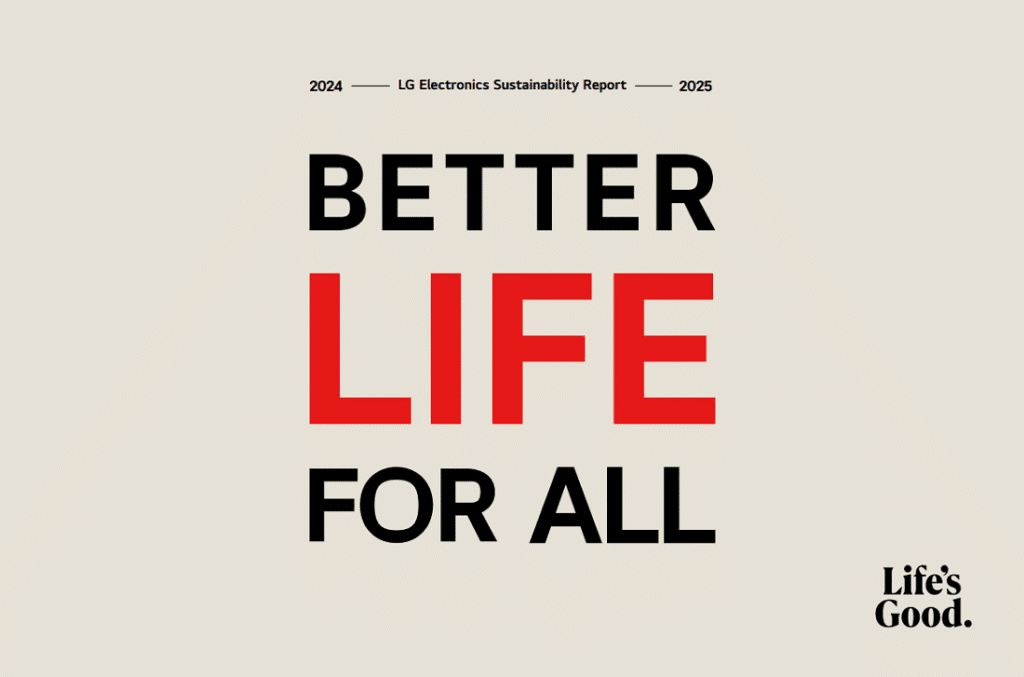LG Electronics (LG) has published its 2024–2025 Sustainability Report, highlighting significant progress made towards achieving its environmental goals by 2030, particularly regarding the reduction of greenhouse gas (GHG) emissions and resource circularity. This report illustrates the numerous initiatives undertaken to make sustainability a central pillar of its operations, in line with its vision of a “better life for all.”
In 2024, LG’s direct (Scope 1) and indirect (Scope 2) emissions amounted to 910,000 tons of CO₂ equivalent, a level close to its target of 878,000 tons by 2030. Through the proactive adoption of high-energy efficiency equipment and carbon reduction technologies, LG is on track to achieve this goal ahead of schedule.
Furthermore, the company has recorded notable progress in reducing Scope 3 emissions related to the use of its products, particularly through the increased integration of artificial intelligence and energy-saving technologies. In 2024, LG reduced carbon emissions associated with its products by 19.4% compared to 2020. LG is also the first South Korean home appliance manufacturer to have its reduction targets validated by the SBTi, including a 20% reduction in Scope 3 emissions by 2030 across seven key categories.
The efforts in circularity are equally remarkable. In 2024, LG achieved a waste recycling rate of 97.4% at its production sites worldwide, surpassing the 95% target set for 2030. The company collected 532,630 tons of used electronic products from 91 sites across 56 countries, bringing the total since 2006 to over 5 million tons. Additionally, the amount of recycled plastic used in LG products increased by 36% in one year.
LG is also continuing its accessibility initiatives with the LG Comfort Kit, which facilitates the use of its devices regardless of users’ age, gender, or abilities, now including 14 products. Features include screen reading, simultaneous audio output for hearing aids and speakers on OLED TVs, as well as height-adjustable interactive kiosks. The company also offers inclusive services such as support programs for people with disabilities, sign language consultations, support for seniors, and in-store workshops on safety, computing, and culture.
In terms of governance, LG is strengthening its practices through an organization based on compliance and ethics. Its board of directors is founded on principles of independence, expertise, and transparency, while the ESG Committee plays a central role in driving sustainable initiatives. In its supply chain, LG promotes shared growth through third-party ESG audits aligned with the standards of the Responsible Business Alliance (RBA).
These efforts have allowed LG to be ranked for the second consecutive year in the “Top 1%” of S&P Global’s Corporate Sustainability Assessment (CSA). The company has also received an “A” rating from MSCI for the fifth consecutive year and has been included in the Dow Jones “Best-in-Class World” index for 13 years.
In summary
- LG becomes the first South Korean home appliance manufacturer to have its climate goals validated by the Science Based Targets initiative (SBTi).
- For the second consecutive year, the company is in the top 1% globally in S&P Global’s sustainability ranking.
- LG is on track to achieve its goal of reducing greenhouse gas emissions by 54.6% by 2030 sooner than expected.
- With a recycling rate of 97.4% at its production sites, LG is already exceeding its environmental commitments.


